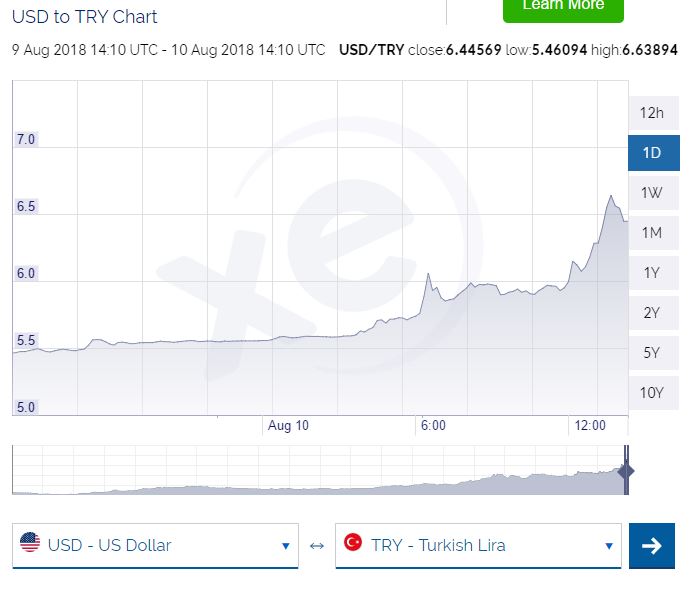Erdogan says Turkey economy under attack as Trump doubles tariffs
US President Donald Trump has announced a doubling of steel and aluminum tariffs on Turkey, piling economic pressure on the NATO ally after its currency went into a tail-spin.
Trump’s announcement on Friday came hours after Turkish President Recep Tayyip Erdogan lashed out against a shadowy international “interest rate lobby” which, he suggested, was “campaigning” to harm Turkey’s economy, after the lira fell more than 14 percent overnight.
Turkey’s currency extended its losses following Trump’s statement, falling 19 percent daily against the US dollar amid growing worries about worsening US relations.
Washington has been pushing Ankara to release an American pastor, who’s being held on terrorism charges.
Earlier this week, Erdogan ordered the asset freeze of two US officials in retaliation for sanctions imposed on Turkey’s justice and interior ministers over the detention of an Evangelical Christian pastor Andrew Brunson.
I have just authorized a doubling of Tariffs on Steel and Aluminum with respect to Turkey as their currency, the Turkish Lira, slides rapidly downward against our very strong Dollar! Aluminum will now be 20% and Steel 50%. Our relations with Turkey are not good at this time!
— Donald J. Trump (@realDonaldTrump) August 10, 2018
At 13:35 GMT, the Turkish lira was down 19 percent at 6.6 against the US dollar. Shares of European lenders also dropped earlier in the day, amid concerns about their Turkey exposure.
But a defiant Erdogan brushed aside concerns, telling a roaring crowd of Turks in the Black Sea city of Rize not to worry.
“There are several campaigns being carried out [against Turkey]. Do not heed them,” Erdogan said.
“If they have their dollars, we have our people, our God.
“Know this: We are better than yesterday, we will be even better tomorrow. Have no doubts about it,” he added.
 |
| Screenshot XE currency charts – Turkish Lira vs US Dollar |
He also renewed a call for Turks to exchange gold and dollars into the local currency, framing Turkey’s currency crisis as a “national battle” against economic enemies.
“The dollar cannot block our path,” Erdogan told a crowd.
“However, I say it once again from here. If there is anyone who has dollars or gold under their pillows, they should go exchange it for liras at our banks. This is a national, domestic battle.”
Turkey’s Trade Minister Ruhsar Pekcan said later on Friday that additional steel and aluminum tariffs were against the rule of the World Trade Organization (WTO).
“Turkey expects other member countries to abide by international rules,” the ministry said in a statement, adding that it would support steel and aluminum exporters in all international platforms. It said the US remained an important trade partner.
Political reasons?
Erdogan, a self-described “enemy of interest rates”, wants cheap credit from banks to fuel growth, but investors fear the economy is overheating and could be set for a hard landing.
Despite the turmoil, Turkey became the fastest-growing country in the world last year, with an economic growth rate of 7.4 percent, according to the government.
Al Jazeera’s Sinem Koseoglu, reporting from Turkey’s largest city of Istanbul, said the Turkish economy – like many other emerging markets – is facing challenges, noting that the lira has come under pressure following a failed coup attempt in July 2016.
She added that “the latest political dispute between the US and Turkey … is actually challenging”, adding that the Turkish government and its supporters believe that there are political reasons behind the lira’s woes – even as analysts warn that the country’s economy has structural problems.
Jane Foley, head of Rabobank’s foreign exchange strategy, said the Turkish government has a huge task ahead to earn back investors’ trust.
She described the situation as “a crisis of credibility” amid some investor concerns over the Central Bank’s perceived lack of independence
“The speculation in the market is that if that Central Bank is to retake credibility, it might need to hike interest rates next month by 5 or 10 percent … which seems very unlikely given that Erdogan is very much against high-interest rates in Turkey,” she told Al Jazeera.
SOURCE: Al Jazeera and news agencies




